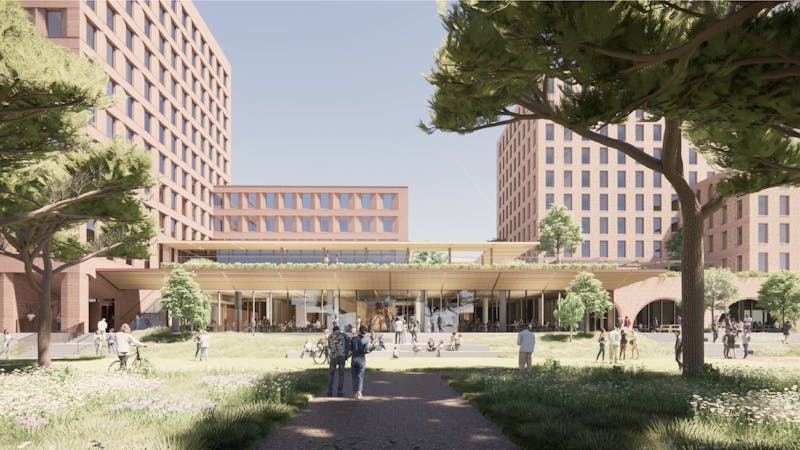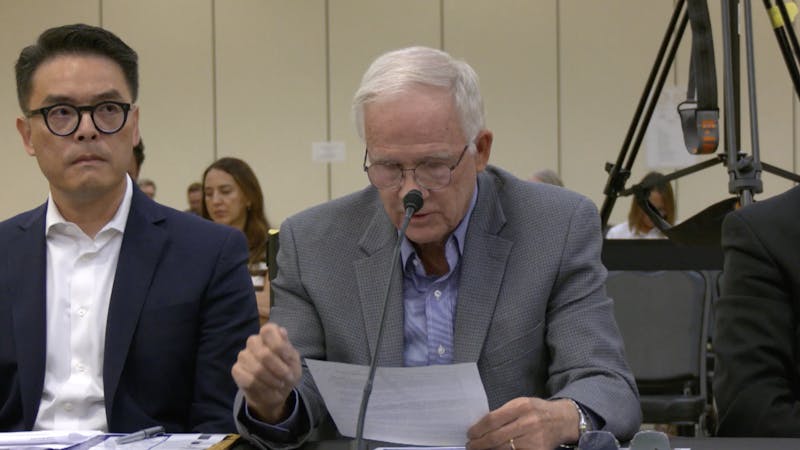Students discuss climate change in Copenhagen
While most students spent their winter recess taking a break from learning, one group of students traveled to Copenhagen, Denmark, for a firsthand look at the politics of climate change. Nine members of the Rice community - Civil and Environmental Engineering Professor Pedro Alvarez, five undergraduates, two graduate students and a staff member - attended the second week of the United Nations Framework on Climate Change, which ran from Dec. 7-18 at the Bella Center in Copenhagen. Representatives from 192 countries took part in the 15th annual convention, known as COP15, to discuss a binding global climate agreement.
Students who participated in the conference signed up through an independent study course during the fall semester, CEVE 499: International Perspectives on Climate Change, the Copenhagen Experience.
Alvarez said the trip gave his students a rare opportunity to learn about the workings of international policy.
"For one, I was hoping [the students] would get a broader perspective on the main barriers and opportunities that exist in reaching international agreements," Alvarez said. "I wanted them to experience the frustration and gratification in ... reaching a common denominator."
In Copenhagen, students attended a conference held in parallel with the actual climate change negotiations, which restricted admittance. Each student chose a different facet of climate change policy to focus on and recorded their travels on a blog at cop15.blogs.rice.edu.
Getting to Copenhagen
Alvarez first entertained the idea of bringing students to COP15 after receiving an invitation to the conference as a delegate from Nicaragua. But instead of flying solo to the negotiations, Alvarez said he realized COP15 presented an ideal opportunity for an independent study course.
However, he said he also soon realized that getting the students to the conference would not be easy. Alvarez said he first had to secure funding to subsidize travel expenses, obtain passports for each student and get passes to the event. The latter appeared troublesome, Alvarez said, as the Bella Center only held an estimated 5,000 individuals, but at least 15,000 people had received passes to the conference. Alvarez asked Robert Harriss, President and CEO of the Houston Advanced Research Center, to write a letter of recommendation on behalf of the group. Upon receiving the letter from HARC, a non-governmental organization focused on sustainable development, the UNFCC granted passes to the group.
Locating a place to stay after arriving in Copenhagen was also difficult. Ultimately, the group found board on a nearby Scandinavian cruiser with students from Yale University and Columbia University. Some groups had to travel more than two hours each day to reach the conference, Alvarez said.
Talking amidst turmoil
The group arrived Dec. 13, one week into the climate change discussion. Among those who attended the talks was Will Rice College sophomore Rachael Petersen, who focused on deforestation and its role in climate-change negotiations. Petersen, an anthropology and political science major, based her focus on an interest in exploring forest policy and the societies that depend on forests.
While at the conference, Petersen and her peers attended a variety of talks from politicians, NGOs and think tank organizations. Participants were also able to take time off to explore the city. Petersen said she noticed a number of groups, including Greenpeace and Climate Justice Action, had convened outside the building to protest all sides of the issue.
Petersen, who considers herself an activist, said although she could sympathize with the protesters' cause, their methods bordered on recklessness.
"Protesters got groups restricted to access from the [Bella] Center," Petersen said. "I'm not sure their message was effective."
By the end of the climate talks, no binding accord had been reached between the 192 countries in attendance. Toward the end of the conference, Petersen said most people had lost hope that a meaningful agreement could be reached. In one instance, an entire room booed when President Barack Obama spoke, Petersen said. However, she said Obama's broad-based approach was better than nothing and something to possibly build on in the future.
Petersen also recalled a number of city governments at the conference that congregated in an alliance to take action at a more local level. Mayors from more than 68 countries participating in the International Council for Local Environmental Initiatives and agreed to lower greenhouse gas emissions in their cities regardless of their national governments' standards. ICLEI is the world's largest alliance of local governments committed to sustainable development.
"Local representatives were sitting and agreeing, but right next door, their heads of state wanted to kill each other," Petersen said. "It's not impossible to find a consensus on this issue."
Returning to Rice
Back home, the students have immediately begun passing on what they learned at the conference. Today at noon in Duncan Hall, members of the class will be giving a presentation on their impressions of the world leaders and their commitment to climate change reform. There may be additional opportunities for presentations in the future, especially during events like next month's National Engineers Week, Alvarez said.
Alvarez also said there is a possibility of attending COP16 in Mexico next year. The close geographical proximity to Rice would lower travel expenses and make the conference much easier to access, he said.
Alvarez said he was disappointed by the outcome of the conference and believes future conventions need to focus more on the major players, such as the U.S. and China, that account for most of the world's greenhouse gas emissions.
"Many stakeholders were disappointed that [COP15] was only able to reach a political agreement that was low on targets and vague on money," he said. "We need to recognize that we are all connected by a common future with joint and common responsibilities.
More from The Rice Thresher

Rice announces Chao College as 12th residential college
Rice announced that the 12th residential college will be named Ting Tsung and Wei Fong Chao College Aug. 19. The college, set to open in fall 2026, will contain nearly 300 on-campus beds.
Dining access fund announced following on-campus unlimited meal swipes
Rice announced new food assistance programs on Tuesday to account for the controversial change in the on-campus meal swipe plan.

Rice disaster prediction model discussed at hearing on deadly Central Texas floods
The House and Senate Select Committees on Disaster Preparedness and Flooding held a hearing on July 31 in Kerrville to address the deadly July 4 flooding in Central Texas. The flooding along the banks of the Guadalupe River killed 108 people, including 37 children. In the charged hearing, Texas lawmakers and flood survivors criticized the local response to the disaster.


Please note All comments are eligible for publication by The Rice Thresher.